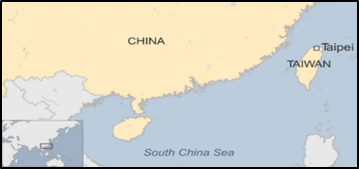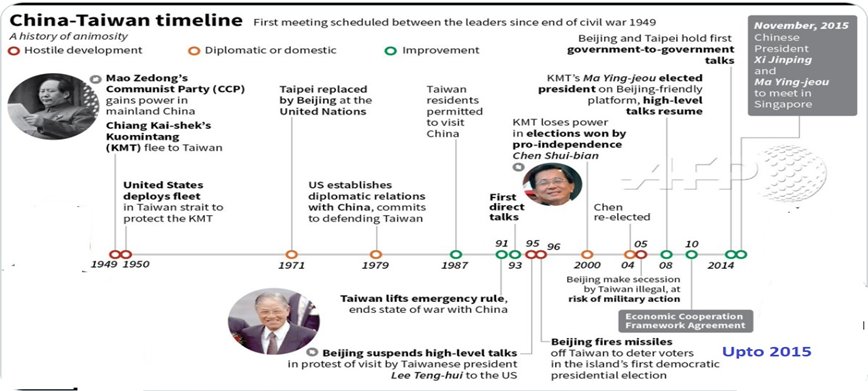In News:
- Pelosi, the top US lawmaker and second in line to the White House, arrived in Taiwan’s capital Taipei.
- This visit took place despite warnings from Beijing that such a trip would be disastrous for US-China ties and threats that it would stop the visit by force.
What’s in Today’s Article:
- China-Taiwan Dispute – geographical location of Taiwan, background, civil war, timeline of dispute etc.
- News Summary
In Focus: China-Taiwan Dispute
Geographical location of Taiwan:

- Taiwan is located north of the Philippines and the South China Sea.
- It is about 180 km off the south-eastern coast of China. It is separated from the mainland by the Taiwan Strait.
Background
- The island seems to have first appeared in Chinese records in AD239, when an emperor sent an expeditionary force to explore the area.
- This evidence is used by Beijing to back its territorial claim.
- After a relatively brief spell as a Dutch colony (1624-1661), Taiwan was administered by China's Qing dynasty from 1683 to 1895.
- In 1895, Japan won the First Sino-Japanese War, and the Qing government had to cede Taiwan to Japan.
- After World War Two, Japan surrendered and relinquished control of territory.
Civil War
- When Japan surrendered, The Chinese Nationalist Party (also known as the Kuomintang-KMT) began ruling Taiwan with the consent of its allies, the US and UK.
- Chiang Kai-shek was the ruler of this party.
- However, almost immediately following Japan’s surrender, the Chinese Civil War broke out between the KMT and the Chinese Communist Party (CPC).
- Chiang and the remnants of his Kuomintang government fled to Taiwan in 1949.
China-Taiwan Timeline (1949 onwards)

Disagreement and confusion about Taiwan
- China regards Taiwan as a breakaway province which it has vowed to retake, by force if necessary.
- China has repeatedly insisted that Taiwan should be called “Chinese Taipei”, in efforts to prevent international recognition of Taiwan as a country.
- But Taiwan's leaders argue that it is a sovereign state. Taiwan continues to participate in international events and dialogues separately.
- It has its own constitution, democratically-elected leaders, and about 300,000 active troops in its armed forces.
Who recognises Taiwan?
- Chiang Kai-shek's Republic of China (ROC) government held China's seat on the United Nations Security Council.
- It was recognised by many Western nations as the only Chinese government.
- However, in 1971 the UN switched diplomatic recognition to Beijing and the ROC government was forced out.
- Since then, the number of countries that recognise the ROC government diplomatically has fallen drastically to about 15.
- India does not have formal diplomatic ties with Taiwan. Like most countries, it maintains commercial ties with Taiwan.
News Summary
- US House Speaker Nancy Pelosi arrived Taiwan on an official visit. She is the highest-ranking US official to visit Taiwan in 25 years.
Key Highlights:
- Both sides amassed military hardware in the region
- More than 20 Chinese military planes flew into Taiwan's air defence zone ahead of this visit.
- Several Chinese warships have also sailed near the unofficial dividing line between China and Taiwan.
- On the other hand, four US warships, including the aircraft carrier USS Ronald Reagan, were positioned in waters east of Taiwan.
- Although, US Navy refers this as routine deployments.
- Chinese stand on this visit
- China has said that this visit is a serious violation of the one-China principle and the provisions of the three China-US joint communiques.
- As per China, this visit sends a seriously wrong signal to the separatist forces for Taiwan independence.
- Hence, it seriously infringes upon China’s sovereignty and territorial integrity.
- Stand of US
- US has reiterated that there was no change in US policy on Taiwan.
- US officials argued that Pelosi is not the first American lawmaker, nor her delegation the first US legislative team to visit Taipei.










